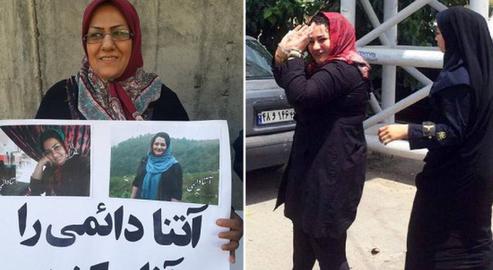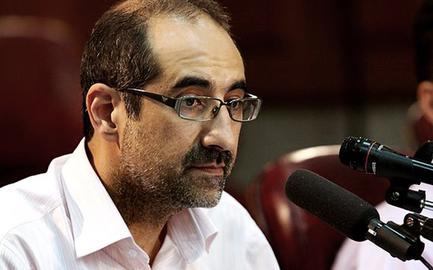An Iranian appeals court has upheld a lengthy prison sentence against two civil rights activists convicted for “insulting the Supreme Leader” and “propaganda against the regime,” despite no trial being held.
In July this year, the Revolutionary Court jailed Golrokh Ebrahimi Iraee, a former prisoner of conscience, and children’s rights activist Atena Daemi each to three years and seven months.
Daemi is already serving a five-year jail term at Evin Prison. According to Iran’s Islamic Penal Code, both she and Ebrahimi have to serve at least two years and one month of their sentence.
They were also banned from “social activities” for two years.
Abas Amiri, Daemi’s lawyer, was handed the verdict of the appeals court on September 4. Amir Raeesian, Ebrahimi’s lawyer, told Ensaf News on September 5 that the judge upheld the sentence without a hearing [Persian link].
Courts of appeal are no longer required to hold trials following an edict issued by Supreme Leader Ayatollah Khamenei in August. Instead, the decision is left to the discretion of the judge.
This rule abrogates a crucial legal right of defendants, especially political prisoners and prisoners of conscience who routinely receive unreasonably heavy sentences in the lower courts.
When Ebrahimi was released from Evin Prison on April 8, she had to post a bail of 60 million tomans (over US$24,000) because she was already indicted in the new case.
She told IranWire: “I have not yet been informed of the new verdict, but found out about it from Ensaf News. About a month ago, they left a message for me and my lawyer that the verdict had been issued.
“But after my lawyer and Ms. Daemi’s lawyer went to the court, they were told that for some reason they could not announce it, even though the lawyers tried two or three times.”
Sentenced Without Trial
According to both Ebrahimi and Masoumeh Nemati, Daemi’s mother, neither defendant was given the opportunity to present evidence to the appeals court.
“Not only we did not participate at our own trial, they did not even hold a session with our lawyers so they could at least defend us,” said Ebrahimi.
Nemati said they “took the right of final defense” from her child, who has a tumor in her breast and is getting “old and ill” in prison.
“Atena was supposed to be released early next summer after serving her sentence,” she said. “But, with the new verdict, she will now be released three years from now.
“My young daughter is spending all her days in prison ... Her physical condition is deteriorating day by day. I am exhausted and feel terrible.”
Judiciary spokesperson Gholam Hossein Esmaili announced the news that courts of appeals are no longer obligated to hold new trials in early August.
Following his announcement, Mohammad Ali Pour-Mokhtar, a member of the Committee on Judicial and Legal Affairs, said: “Holding a trial by the courts of appeal is at the discretion of the presiding judge.
“This is not something new. Holding such a trial is not obligatory ... [Even in the past] the trial was only held if it was decided that individuals needed to be in court so they could clarify matters."
Facebook Posts as Criminal Acts
Daemi, born in 1988, was first arrested on October 21, 2014. The Revolutionary Guards held her in “temporary detention” at Evin Prison in Tehran for several months.
On March 7, 2016, Daemi stood trial on charges of “conspiracy against national security,” “propaganda against the regime,” “insulting the Supreme Leader and the sacred,” and “concealing evidence of a crime.”
According to a source quoted by the Center for Human Rights in Iran (CHRI), all charges against Daemi were based on her Facebook posts, information stored on her phone, and her protests against the death penalty and acid attacks on women in Isfahan.
In the lower court, Judge Mohammad Moghiseh – who the European Union has accused of violating defendants’ human rights – jailed Daemi for 14 years, of which she would be required to serve seven.
In 2017, Daemi went on a 55-day hunger strike at Evin Prison to protest against the verdict handed down to her and her two sisters, Aniseh and Hanieh, on spurious charges.
She ended her hunger strike only after an appeals court struck down the additional charges against her and her sisters on June 1, 2017.
Punished for an Unpublished Story
Ebrahimi was jailed for six years in 2016 on charges of “insulting Islamic sanctities” and “propaganda against the regime” in connection with an unpublished story about the Islamic punishment of “death by stoning” for adultery.
Authorities discovered the story on September 6, 2014, when men believed to be Revolutionary Guards agents arrested Ebrahimi and her husband Arash Sadeghi at his workplace in Tehran.
The men did not present an arrest warrant. They took the couple to their house, where they searched their possessions and seized items, including laptops, notebooks, and CDs.
“I was accused of ‘insulting the sacred’ based on the handwritten stories and poems they found in my home,” Ebrahimi told IranWire in a 2016 interview after her conviction.
“They were never published anywhere. The night we were arrested, they searched the house and seized my writings.
“Afterward, based on these writings and a Facebook post in support of Shahin Najafi [an Iranian musician whose songs are considered ‘blasphemous’ and who now lives in Germany], they gave me five years in prison.
“I got another year for ‘propaganda against the regime’ for my Facebook posts and for my relations with the families of political prisoners and those [who had been] executed.”
According to Amnesty International, Ebrahimi was subjected to “long hours of interrogations while blindfolded and facing a wall,” and that interrogators repeatedly told her she could “face execution for ‘insulting Islam.’”
The human rights organization reported: “She could also clearly hear interrogators threatening and verbally abusing her husband in the next cell, adding to her distress.
“Arash Sadeghi has since said he was tortured while in custody. His interrogators kicked him, punched him in the head, slapped him, and choked him.”
Sadeghi is currently serving a 15-year prison sentence in Evin Prison on charges including “spreading propaganda against the system,” “gathering and colluding against national security,” and “insulting the founder of the Islamic Republic.”
He underwent a biopsy in June 2018 and was diagnosed with a rare form of cancer that causes bone tumors, a source with detailed knowledge of his case told CHRI.
In 2017, he was told by his interrogators at Rajaei Shahr Prison that he would be denied medical treatment.
Meanwhile, the Tumors Grow
Daemi has also been denied medical care for a tumor, according to her mother.
“A year and a half ago, a tumor was found in my daughter’s breast,” she said. “The doctor said she must be examined every six months, but during the past year and a half she has not been taken to the hospital.
“We have requested this repeatedly, but they have ignored our requests. Last time, the prison gynecologist told prison officials that Atena must be transferred to hospital for mammography and sonography, but nothing has been done.
“A while ago, the doctor examined her and said the tumor has grown bigger.”
Nemati also said that the family has been banned from visiting her daughter at Evin Prison since March 10.
“When Ali Chaharmahali was Evin’s chief warden, we repeatedly requested to see Atena in person, but he did not agree,” she said.
“A month ago, they appointed a new chief warden, but for unknown reasons he hasn’t allowed us to visit Atena in person, either.”
Gholamreza Ziaei was appointed as Evin Prison’s chief warden on July 2. Previously, he was the head of the notorious Rajaei Shahr Prison in Karaj, near Tehran.
In January 12, 2018, Ziaei was sanctioned by the US Treasury's Office of Foreign Assets Control as “responsible for, or complicit in, ordering, controlling, or otherwise directing, the commission of serious human rights abuses against persons in Iran or Iranian citizens or residents.”
In the aftermath of the disputed 2009 presidential election, Ziaei was the head of Kahrizak Detention Center where many protesters were tortured and several died after being denied medical care.
Now there are reports that Ziaei has brought the same “style” of management to Evin Prison, including the removal of health insurance for the inmates and limiting family visits.
“It is a terrible situation to be in,” Nemati said. “We feel hopeless. We don’t know what else we can do.”
Related Coverage:
Activists Face Fresh Trumped-up Charges in New Trial, June 19, 2019
Crackdown Continues as Fresh Charges Brought Against Civil Society Activist, May 31, 2019
Iran's Female Political Prisoners, February 13, 2019
"I Fear for My Daughter," Says Atena's Mother, May 17, 2017
What do the Revolutionary Guards Have Against my Daughter?, April 27, 2017
Atena Daemi: "I Will Not Stand Silent", October 10, 2015
Civil Society Under Attack: The Cases of Atena & Atena, June 18, 2015


























comments